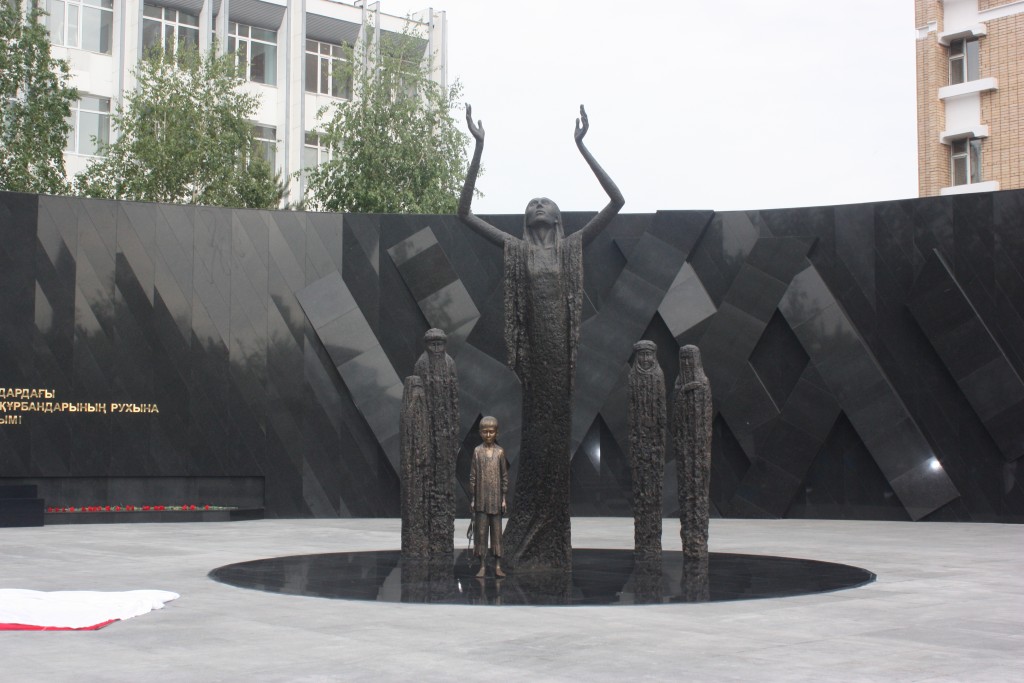The memory of the Holodomor silenced in Astana
The removal from a monument of the Russian word used to refer to the famine caused by Stalin in the 1930s with the forced abolition of small private farmers has sparked controversy. In present-day Kazakhstan, as in Ukraine, hunger killed millions of people. Behind the formal explanation of the “correction” lies the delicate balance in relations with Moscow.
Astana (AsiaNews) - One of the most discussed topics in Kazakhstan in October was the announcement that the words ‘Victims of the Golodomor’, i.e. the famine caused by the forced establishment of kolkhozes that excluded private farmers, contemptuously called kulaks, the ‘profiteers’. Now the inscription has been changed without public notice to ‘Victims of the famine of 1932-1933’, replacing the term golod, “famine”, with Golodomor, ‘famine caused’ by repressive actions.
Accusations of “flirting with Moscow”, “betraying the national idea” and cowardice in avoiding the memory of Stalin's and the Russians' crimes have appeared on social media, with calls to “call things by their proper names”.
The tragedy of the early 1930s only began to be discussed after independence was proclaimed in 1991, commemorated on 25 October for the declaration of sovereignty already approved in 1990, while during the Soviet period the subject was absolutely taboo. For Kazakhs, the Golodomor is one of the main reasons for self-awareness in relation to the long Russian-Soviet domination.
According to data collected by Kazakh historian Erlan Sajlaubaev, the number of victims of the Holodomor reached between 1.5 and 2 million people, while academic Myrzataj Žoldasbekov believes that the real number is around 2.3 million, “almost half of the Kazakh population at the time”.
Research by the Institute of History of Kazakhstan shows that, in addition to the victims, at least one million people fled the country to Chinese Xinjiang, other Central Asian countries, and even Afghanistan and Iran. Even greater were the losses of the Ukrainian Holodomor, which reduced the population by almost 5 million people.
The authorities' explanation was rather formal, stating that the correction was necessary to bring order to the Russian text and the Kazakh translation, but this did not convince the public, given that the Kazakh term Ašaršylyk affixed to the memorial properly indicates “mass starvation”, and is therefore much more closely related to Golodomor than to the simple golod. The change appears even more like a favour to Russian speakers, avoiding the criminal term.
The real reason for the operation seems rather to lie in the realm of foreign policy, which Kazakhstan has proposed as “multi-vectorial” since its independence, always seeking to balance relations with the main centres of world power: Russia, China, the West and the Muslim world. President Kasym-Žomart Tokaev had explicitly condemned Russia's invasion of Ukraine, but on several occasions he then compensated for this position with overtures to Russia, trying not to cross the “red line” that could have infuriated Moscow, with disastrous consequences for Kazakhstan.
The term Holodomor, in its Ukrainian variant, has now become common worldwide, and from simply meaning “mass famine”, it explicitly refers to the actual genocide of Ukrainians and Kazakhs carried out by Stalin, whose personality is increasingly being re-evaluated in Putin's Russia. Dozens of countries, starting with the US, Canada and most of Europe, officially recognise Stalin's crime, and at a time of Russia's wartime “denazification” of Ukraine, leaving this term in place seemed too sensitive and inappropriate for Kazakhstan's cautious diplomacy.
The removal of “Holodomor” was requested by a pro-Russian left-wing organisation in the country, the “Company of Kazakh Communists of Krasnaya Yurta”, which recalls the “red tents” created by the Soviets in the 1920s and 1930s as “schools of Marxism-Leninism”, just when in the real yurts, the peasants' country tents, people were dying of hunger due to the Golodomor. Today, ideology is no longer imposed, but we remember the fate that could befall the nomads of the steppes in a world dominated by war.
12/02/2016 15:14







.png)










